Kelly Reichardt’s Certain Women (2016): Criterion Blu-ray review
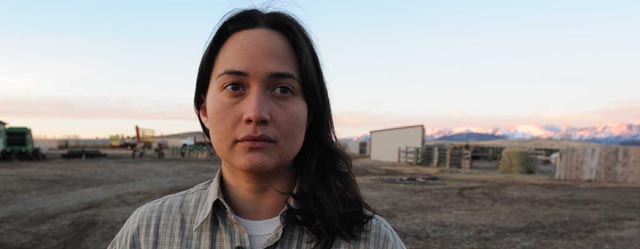
There are some filmmakers who do so much while seeming to do so little that their craft is a kind of creative alchemy. There is a stillness to their work, a deliberate absence of large gestures and superficially meaningful events and one’s initial impulse is to call them “minimalists” … and yet that seeming smallness contains such depths of emotion and meaning that their work is experienced as more profound than anything more overtly expressive. This small company includes Ozu Yasujiro, of course, and Robert Bresson … and among contemporary filmmakers, Kelly Reichardt.
In Reichardt’s work, the characters’ relationship to landscape is vitally important. Her most recent film, Certain Women (2016), like her 2010 “western” Meek’s Cutoff, situates human figures within vast, open, inhospitable spaces. The power exerted by these environments forces the characters to find some kind of inner strength in order to survive. There is nothing triumphal in this survival, rather a stoic determination not to be beaten. In a broad sense, these films can be read as feminist, but Reichardt resists didactic assertions in favour of small human moments. Her characters are flawed but deeply moving in the ways they grapple with the challenges – interpersonal, social and economic – which life puts in their way.
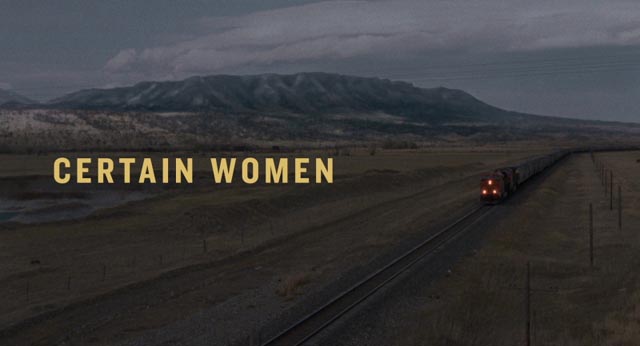
Certain Women, adapted by Reichardt from three stories by Maile Meloy, is set in Montana in winter, centred on the town of Livingstone, which sits on a plain with bleak mountains looming in the distance, and the far smaller town of Belfry which is a four hour drive away. The women of the title are Laura (Laura Dern), a lawyer dealing with a personal injury case; Gina Lewis (Michelle Williams), a businesswoman who has recently transplanted to the area with her husband and teenage daughter; and an unnamed ranchhand (Lily Gladstone), who spends her days tending horses in cold barns and snowy, windblown pastures. These characters connect only in brief tangential ways; their stories are separate, but together express a longing for human connection which remains tentative in this implacable, expansive and physically demanding landscape.
Reichardt establishes an air of emotional tension with the first shots of the film – a long-held view of a freight train approaching across the plain from the distance and passing the camera as the opening titles fade in and out, a classic image of emptiness and the transient passage of something human through an indifferent world, which gives way to a wide interior shot in which we can see two rooms – a bedroom on the left and a kitchen on the right. We have a partial view of a woman lying in the bed, gradually gathering together her clothes, while a man stands in the other room getting dressed. He begins with a pair of longjohns, signalling that the world just outside this room is a cold place. To finish, he returns to the bedroom to pull on his boots and the woman makes a tentative effort to start a conversation; he barely responds before leaving.
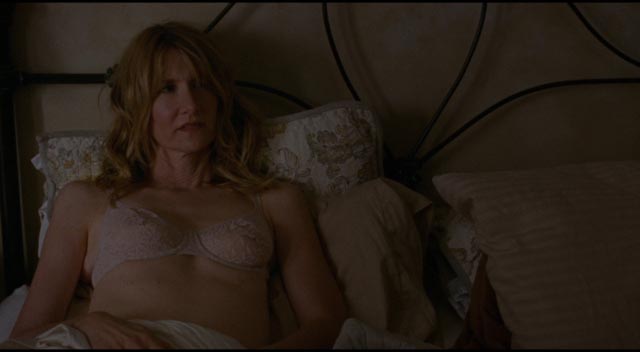
This opening creates a sense of unease, not simply because of the obvious echoes of the opening of Psycho (an impersonal landscape giving way to an intimate interior space at the end of a lunch-hour sexual encounter), but also because, in contrast to the argument between Marion Crane and Sam Loomis about their relationship, this couple seem unable to communicate at all. There is an emotional chill in the man’s unwillingness to speak and in the woman’s unwillingness to press him on it, a cool suggestion of the impossibility of any real connection which is also contained in the fragmentation of the images. Reichardt’s off-centre framing, which first splits the image through decor – the woman in the bed, the man simultaneously visible dressing in the next room – and then fragments the idea of a shared space when he returns to the bedroom for his boots; there is a vast emptiness in the centre of the frame here, with him down low and her partially visible high in a mirror on the wall. They are unbalanced and apart even though they are in close physical proximity. Reichardt’s use of the camera here expresses so much and yet with so little emphasis. A mundane moment is somehow transformed in the viewer’s mind into something deeply unsettling, establishing a feeling of tension which pervades everything which follows.
The first story deals with Laura, who returns from her lunchtime encounter to the law office where she works, obviously deflated by the sight of a man waiting for her. He is Fuller (Jared Harris), victim of a workplace accident which has left him with some brain trauma (headaches, blurred vision) which has put a great deal of strain on his marriage. He is seeking compensation through a civil suit, although Laura has been patiently explaining to him for months that regardless of his employer’s negligence, the small amount of worker’s compensation he took immediately after the accident precludes any further legal obligation to him. He has obviously been wronged, but the law says he has no recourse. Laura tells him she has made an appointment with another personal injury lawyer, whom they go to see together a few days later. When this man also tells him there is nothing that can be done, Fuller meekly accepts what he says – when it comes from a man, Fuller believes it, although he’s been hounding Laura for months to do something for him.
This closing off of any legal process leads Fuller to an act of desperation, which in turn is followed by a betrayal on Laura’s part which can also be seen in retrospect as an act of kindness.
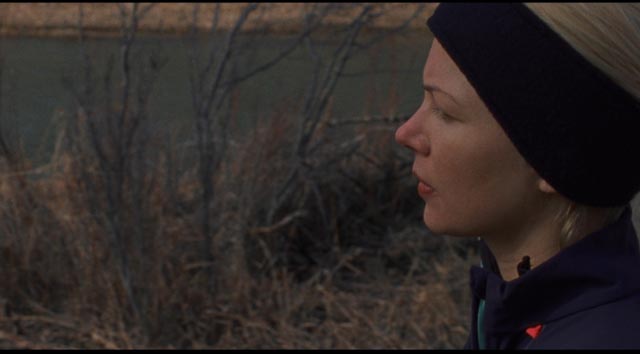
That moment of betrayal cuts abruptly to a muddy path in leafless woods where Gina Lewis is out for a morning run. She is dressed in an outfit which seems almost to crush her, a tight running suit which suggests a space suit’s protection against an unfriendly environment. She pauses on her run for a smoke, carefully and deliberately extinguishing the butt by digging a small hole in the path with her foot, grinding it out thoroughly and covering it over. Her run ends in a field which has been laid out with posts and line to mark off the outline of a house yet to be built, just beyond which is a large tent where she has obviously been staying with her teenage daughter Guthrie (Sara Rodier) and her husband Ryan (James Le Gros) – whom we immediately recognize as the man from the opening scene who is having an affair with Laura.
Guthrie seems hostile and resentful towards Gina, unhappy with being forced to camp out here when she’d rather be comfortable in town. Ryan insists that she (and he) need to be nice to Gina because “she does so much for us”. Knowing of his affair, we can sense at least a modicum of guilt in his concern. And later, when he tells someone that she in fact owns the company and he works for her, we see resentment and, in retrospect, can understand his coldness to Laura after sex as an assertion of power, an attempt to exert control in this area of his life while he feels little in his marriage.
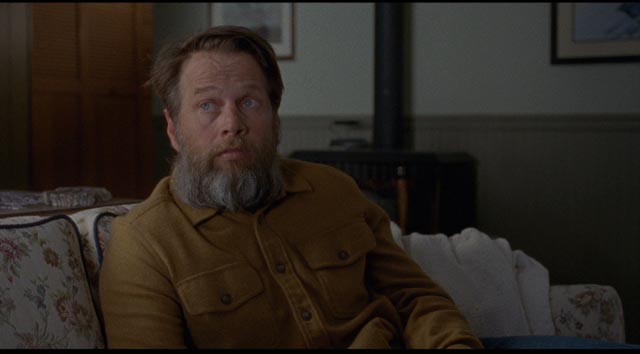
This second story is the slightest in terms of narrative – Gina, in a quest to establish a sense of “authenticity”, wants to acquire a pile of sandstone from an old man in whose yard these remnants of an old schoolhouse lie – but it is central to the film’s theme of the fragility of human connection and the need to overcome a deep existential fear by grounding oneself in the physical space which one inhabits. Gina’s need to control, to create that sense of authentic belonging, paradoxically pushes away those closest to her. And in the end, the pressure she puts on the old man, Albert (Rene Auberjonois), to sell her the stone seems selfish and cruel.
In the third story, the unnamed ranchhand has made an accommodation with the landscape and Reichardt spends a great deal of time simply observing her daily routines – cleaning the stables, feeding and watering the horses, running about the property on a quad with a lively corgi chasing after her and barking. She seems at peace with this place and with her place within it. But it’s a lonely life, and one evening in the nearby town of Belfry she sees a few people going into the school and follows them for no other reason than to be in the presence of others. It turns out that these people are local teachers who have signed up for an evening course in school law which is being given by Elizabeth Travis (Kristen Stewart), a young lawyer from Livingstone who has to drive four hours to get here two evenings a week. (These classroom scenes contain much of the film’s quiet humour; while Beth speaks of student rights and their impact on modes of discipline, the teachers ask about their right to a designated parking space.) Sitting at the back of the room, the ranchhand is fascinated by this woman from another place, from another life entirely. At the end of the class, Beth asks if there’s anywhere to eat before she makes the four-hour drive home and the ranchhand leads her to a local diner.
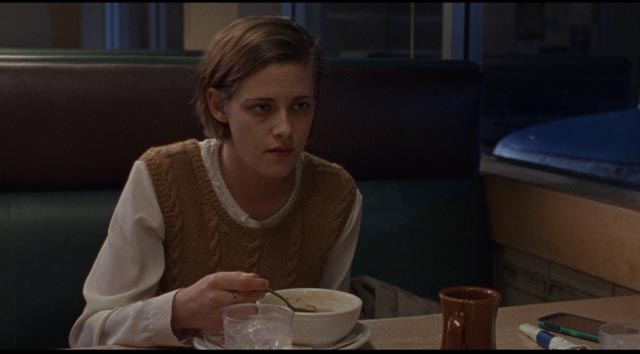
While Beth eats, the ranchhand watches her closely, occasionally prodding her with questions about her life – Beth comes from a poor working family and feels only a tentative connection with her career as a new lawyer; she has always feared that she’d end up as a shoestore clerk, which is the highest status anyone from her family could legitimately expect. Yet for all her nervousness, her insecurity, the air of defeat which already hangs over her, the ranchhand is drawn to her as something different and special, an avatar from another world seemingly inaccessible to her.
As she attends the classes and spends time with Beth at the diner, the ranchhand’s unspoken attraction grows stronger, culminating in a nighttime ride together on a horse. But on the evening of the next class, Beth doesn’t appear; there’s a man there who says he’s taking over because the drive was too much for her. The ranchhand leaves the class and sets out to drive her truck overnight to Livingstone; when she gets there, she wanders the streets looking through the windows of all-night diners and locating a number of lawyers’ offices which she revisits in the morning, asking if anyone knows Beth.
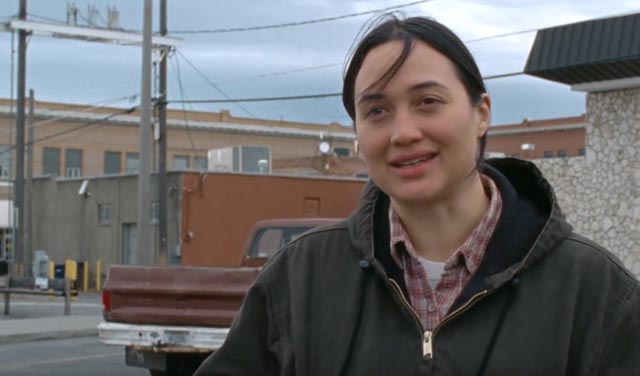
The scene in a parking lot when she finally finds Beth and realizes that her romantic feelings are entirely one-sided, and the long-held shot on her face as she drives away from town, are devastating … yet more than the other women, she is grounded in her life on the ranch, even in the face of such disappointment, and she returns to her routines with the same steadfast dedication as before.
Each story is briefly revisited at the end of the film, not to tie up loose ends or provide a clear resolution, but rather to show these women continuing to inhabit their lives, continuing to make what they can of their fragile human connections. The film evokes a deep sense of melancholy shot through with small traces of hope, and it does so by quietly observing the smallest details of these women’s lives.
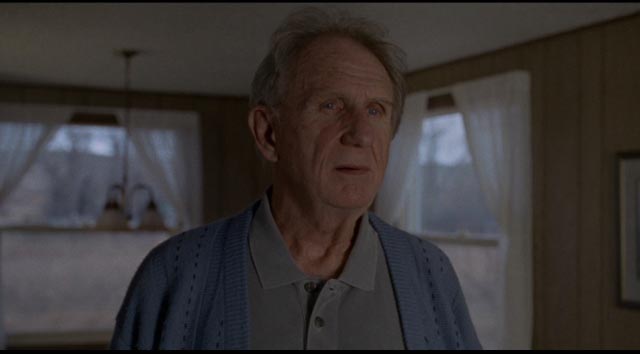
It’s difficult to say exactly how Reichardt creates these effects. The surface of the film is quiet – there is little dialogue and her camera remains unobtrusive throughout – yet from the first shot, she instills an emotional tension which keeps the audience alert to the smallest gesture, the most transient expression. How is it that we feel we know these characters so well and so deeply even while being given so little information about them? The importance of performance can’t be overstated and Reichardt gets superb work from her cast; somehow we seem to see every thought, every fleeting emotion which passes through them, all of which are captured with a precise use of a camera which conveys information at an almost subliminal level. Like Renoir, Reichardt has a deep empathy for every character, a mixture of admiration for their achievements and compassion for their flaws, and the cast respond by revealing themselves without hesitation. Certain Women is a film which shows us human experience with often heartbreaking clarity.
*
The disk
The Blu-ray presents the film’s imagery with a great deal of visual texture, thanks to an excellent 2K transfer from the original 16mm photography. It’s a pleasure to see something so carefully shot on film rather than digital video, particularly a film whose impact depends so much on a combination of vast open landscapes and close-up faces. This technical aspect is as important to the film’s emotional power as the performances and editing.
The use of diegetic sound emphasizes the spareness of the film – there are a handful of songs and voices heard on car radios and TVs, but very little actual score; the soundtrack relies on the careful use of natural sounds, wind, water, horses’ hooves, engines and train horns, that dog barking, and human voices – which adds greatly to the impact of the quiet piece by Jeff Grace which plays over the shot of the ranchhand driving away from Livingstone after she tracks down Beth.
The supplements
Criterion’s Blu-ray includes three short interview featurettes with Reichhardt (14:13), executive producer Todd Haynes (14:35) and writer Maile Meloy (13:12), which cover the origins of the project, the process of adaptation, and the particular qualities of Reichardt’s filmmaking. The details of Reichardt’s approach to adaptation are interesting in light of the particular problems of combining three separate stories into a unified film: the biggest changes she made to the source material were making Ryan Laura’s lover in the first section, the addition of the teenage daughter to the middle section (brought in from a different Meloy story) and, especially, changing the ranchhand in the third part from a man to a woman, which radically transforms the character’s longing for Beth and the risk she takes in pursuing Beth back to her own world.
There is also a theatrical trailer (2:00) and a booklet essay by critic Ella Taylor.
Comments